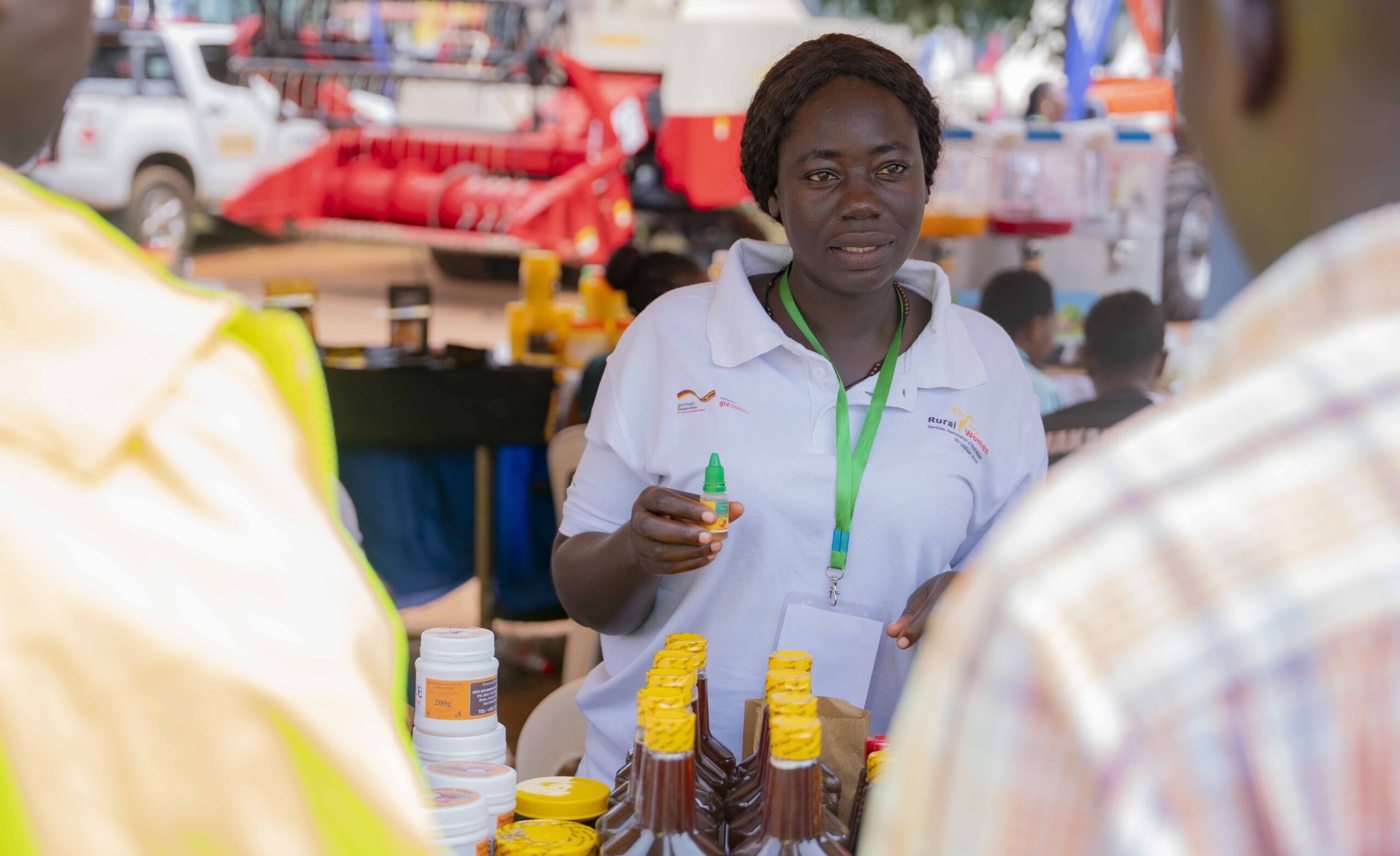As a female entrepreneur, I’ve encountered challenges such as limited capital for business expansion, transportation issues, physical visibility for product display and production, and compliance with regulatory standards like those set by the Uganda National Bureau of Standards.
1. Could you introduce yourself and share some details about your business venture?
I’m Adakuru Winfred, a female youth from Arua District, Uganda, who co-founded Winnie Bee Enterprise Limited and serves as its Chief Executive Officer.
The company idea began in 2017 while I was still a student, but it really took off in 2020, at which point I was able to brand the products and began to see an increase in sales. Previously, I was handling everything alone, but by 2022, I was able to hire five women who receive monthly pay and four who receive casual pay just on production days.
2. What inspired you to start your honey business, and what products do you offer?
The demand for quality honey in Entebbe sparked my business idea. Since the best honey originates from the West Nile, I would always deliver it to the various Entebbe residents who would ask me for free honey throughout my time in school in 2017. This gave me confidence, and I saw that Entebbe needed high-quality honey, that my market was ready, and that I was ideally situated in busy areas.
The products the enterprise offers are honey, bee wax, propolis, peanut butter with simsim, simsim butter, groundnuts and simsim snacks, pumpkin seed snacks, and millet porridge with simsim butter and tamarind.
3. How do you source your honey, and what quality control measures do you implement?
I source my honey from rural farmers, including women and youths that are involved in apiary farming, and as per my quality control, I use a refractometer to test the moisture content of the honey that I always purchase, which is 17% below, and I always hire experts in harvesting who have protective gear to go and harvest once the farmers notify me.
4. Many youths don’t consider agriculture an attractive venture. What inspired you to venture into honey value addition?
The global demand for high-quality and affordable honey is where my inspiration in this venture stems from. I recognized that households, hotels, hospitals, industries, schools, and supermarkets worldwide are seeking reliable suppliers of quality honey. This realization sparked my interest in honey value addition, and I saw it as a chance to make a meaningful impact in the agricultural sector.
5. UNYFA is currently running the Women in Agriculture Campaign. As an agricultural entrepreneur, what are some of the limitations on women’s participation in agriculture?
Women in agriculture face challenges, including poor yields, lack of ready markets for their products, price fluctuations, limited access to transportation, inadequate farming equipment, and sometimes, a lack of motivation. These barriers can significantly hinder women’s progress and participation in agricultural activities.
6. What challenges have you faced as a female entrepreneur in the agricultural sector, and how have you overcome them?
As a female entrepreneur, I’ve encountered challenges such as limited capital for business expansion, transportation issues, physical visibility for product display and production, and compliance with regulatory standards like those set by the Uganda National Bureau of Standards.
To overcome these challenges, I’ve adopted strategies like online marketing, networking, and door-to-door deliveries upon receiving orders. I’ve also engaged in cash round distributions to raise funds for honey purchases and resorted to renting a small production space. Participating in trade shows and exhibitions has also been beneficial.
7. How do you market and distribute your products, and what strategies have been most effective?
Our marketing strategy involves leveraging social media platforms like WhatsApp and Facebook, referrals, and participating in trade shows and exhibitions. Social media has proven to be particularly effective for marketing our products.
For distribution, we utilize various transportation modes, including motorcycles, buses, taxis, and even aircraft, depending on the customer’s location and needs.
8. Women are marginalized globally yet play a key role in agriculture. What advice do you have to promote equal participation in decision-making?
My advice to women is to approach agriculture with passion and positivity. Given that women are the primary food producers, I encourage them to participate wholeheartedly in agriculture. This can enable them to influence decision-making processes, which will contribute to more equitable outcomes.
9. How would you encourage nationwide youth participation in agriculture?
I would encourage youths to participate in grants and low-interest loan programs that can support them in starting or expanding their agricultural ventures. Access to such financial resources can empower youths to contribute meaningfully to the agricultural sector.
10. What role has the Young Farmers’ Federation of Uganda played in your honey business and personal development?
In my business, the Young Farmers Federation of Uganda has been very important, such as purchasing for me honey equipment that includes a honey press, refractometer, double sieve, 4 airtight buckets, and a conical sieve, which have improved the quality of my production.
They have also exposed me to more customers through participating in national agricultural shows and other exhibitions, such as the celebrations of International Day of Rural Women, whereby I was featured in the Seeds of Gold magazine in November 2024, published by Nation Media Group. This exposure also increased the number of my customers.
11. The German Association of Rural Women recently visited you. What does this recognition mean to you?
The German Association of Rural Women’s visit to me last month boosted my confidence and opportunities for my business. It also inspired other rural women and youths in my community.
Interview compiled by Oscar Kakande

